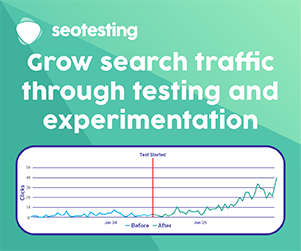News from the EDGE: Week of February 15, 2021
On tap this week is desktop messaging for Google My Business, why some do not like the scroll-to-text feature in SERPs (hint: Mordy hates it), and what the heck Google’s Passage Ranking really means. Host Erin Sparks and Studio Creative Director Jacob Mann along with Mordy Oberstein, Wix’s SEO Liaison, cover these key stories in this week’s news roundup, episode 394 of the award-winning EDGE of the Web podcast!
GMB Messaging for Desktop Now Rolling Out
From Rebekah Dunne on Search Engine Journal we see GMB Messaging for Desktop Now Rolling Out. Google My Business is rolling out Messaging for desktop users. With the rise of zero-click search and heightened consumer expectations around brand responsiveness, it’s no surprise that the Business Messaging function is coming to the desktop. If you are not seeing Messages in your GMB desktop dashboard, you will be soon.
- Erin Sparks: This messaging back and forth directly with customers and prospects has already been happening on the GMB mobile app, but now it can happen for desktop users as well. I for one don’t understand why it took them this long to roll out desktop messaging. It should have happened at the same time as the mobile app.
- Mordy Oberstein: This hasn’t really impacted me because I don’t do any local SEO, really. It’s all more international, or at least not local. I’m guessing it was rolled out first for mobile on the assumption that the local small business owner is running around doing stuff and not chained to a desktop computer. And it’s also an attempt to try to really elevate GMB as a hub where business actually happens, not just information about businesses.
- Erin Sparks: Yes, and there are quite a few features and functions on GMB that help facilitate the doing of business, such as the lead forms, exclusive calls to click within the GMB platform, and so on. Google wants GMB be a real platform where business gets done. And it’s certainly more powerful a platform than what you get on Facebook, which doesn’t really go much beyond brand awareness. For desktop messaging you do have to specifically opt-in for the messaging function. But Google can also revoke your access to the messaging tool if you’re too slow in responding to messages, so you have to stay on top of that and always answer within 24 hours. You also need to be vigilant and diligent about making sure message content is not offensive, reporting any spam right away if it’s happening, and so on.
Google Search Scroll-to-Text On Free Product Results
Over on Search Engine Roundtable from Barry Schwartz we learn about Google Search Scroll-to-Text on Free Product Results. Google is expanding the scroll-to-text feature it has on featured snippets and some other search elements to the free top product listings boxes. The scroll to text feature is when you click on a search result in Google, Google then takes you to the web page and scrolls you down the page to the specific passage and highlights the relevant block of text.
- Mordy Oberstein: I find this particular feature angering, really. It worked fine when it was for text in a featured snippet, but if you’re talking about a product review, do you only want to go to whatever tiny bit was featured in the carousel? No! You want to read the full review from the beginning of the review. You don’t want to be dumped into just one bit of the review. You lose all the contextual authority the site has worked hard to build. You lose the feeling that the site is giving you this valuable information and instead that Google is giving it to you, and that makes me angry.
- Erin Sparks: It’s yet another example of Google giving more attention to its own branding than the site from which the information originates.
- Mordy Oberstein: It’s not as bad for featured snippets but I don’t like it even there because once again it’s Google taking over your URL, right? But it really doesn’t work well for reviews. And what if my website is all about why the color yellow sucks, but with this scroll-to-text feature you’re going to get the relevant text highlighted in YELLOW. Obviously, that’s a very niche example, but you get the point. Whose site is it it? Is it yours or is it Google’s to do with whatever they please? On a more serious note, the highlighting is a pretty dark yellow, which could actually create accessibility issues for some users in terms of the contrast. Just like Google’s very vague now about how “do not indext” pages might still get included in Core Web Vitals? What the heck? Why have a “do not index” function if they’re just going to crawl it anyway? Again, whose site it? Yours or Google’s?
- Erin Sparks: It does seem like this ongoing issue of how much of your site and your content and your business is Google going to control? This issue isn’t going away.
- Mordy Oberstein: And another thing: The scroll-to-text feature could be taking users right past important calls to action (CTAs) and other things that would help with conversions!
- Erin Sparks: Jacob found you can insert a document policy at the browser level and then at the web development level to force it load at the top of the page.
- Mordy Oberstein: Yes, but that’s you having to do something to opt-out when what it should be is a conscious opt-in if you want scroll-to-text.
Google Passage Ranking Now Live in US English Search Results
Another one from Barry Schwartz this time on Search Engine Land: Google Passage Ranking Now Live in US English Search Results. In October 2020, Google announced passage indexing, a new way of Google ranking specific passages from a web page in search. Google has updated us that passage ranking, as they are now properly calling it, went live on Wednesday, February 10, 2021, in the afternoon Pacific Time for queries in the US in English. Google said passage ranking will affect 7% of search queries across all languages when fully rolled out globally. It is now live in the US/English results, so it should have an about 7% impact in the US/English search results. If your rankings changed in the past 24-hours or so, it might be related to this change.
- Mordy Oberstein: The original announcement about this was one of the worst attempts at communication I’ve ever seen from Google. It was originally called passage indexing, which was dumb because it had nothing to do with indexing. What it’s really doing is just getting more granular in its understanding of the various bits and pieces on a page and adjusting the ranking for that page (not just a little passage of it) based on its deeper understanding of the page’s content. Because at first people wondered if the passage in question that matches a particular search query would pop up like a featured snippet or something, and it’s not that at all. So it’s adjusting page rankings based on a “passage-level analysis” of the page.
- Erin Sparks: So it’s a drilling down into a page’s content at a more micro-level to understand a page better. You have to keep an eye on these things.
- Mordy Oberstein: But as far as this goes, website publishers don’t have to actually do anything to optimize for this. It’s just Google going deeper to understand a page. In other words, don’t go and “SEO your content,” which tends to make your content crap in the attempt to please a search engine. Don’t do it!
Mordy shared that the Wix SEO Advisory Board is official. They’ve lined up some incredible SEO experts to be on a board to advise their product development efforts from an SEO angle to make sure Wix remains highly SEO-friendly platform to build websites with SEO in mind. Wix is probably the first major content management system (CMS) to do this sort thing, and it’s important to see a CMS taking this step. It’s good for the industry and it’s good for users.
This week on SEO chat is going to be a great discussion with Debi Norton about SEO for small businesses. Join the weekly chat on Twitter by tuning in to #SEOchat on Thursday at 1:00 pm eastern time to contribute to the conversation!
Connect with Mordy Oberstein, Wix’s SEO Liaison
Twitter: @MordyOberstein (https://twitter.com/MordyOberstein)
LinkedIn: https://www.linkedin.com/in/mordy-oberstein-12551715/
Connect with Erin Sparks, Host of EDGE of the Web and CEO of Site Strategics
Twitter: @ErinSparks (https://twitter.com/erinsparks)
LinkedIn: https://www.linkedin.com/in/erinsparks/



 –>
–>


















